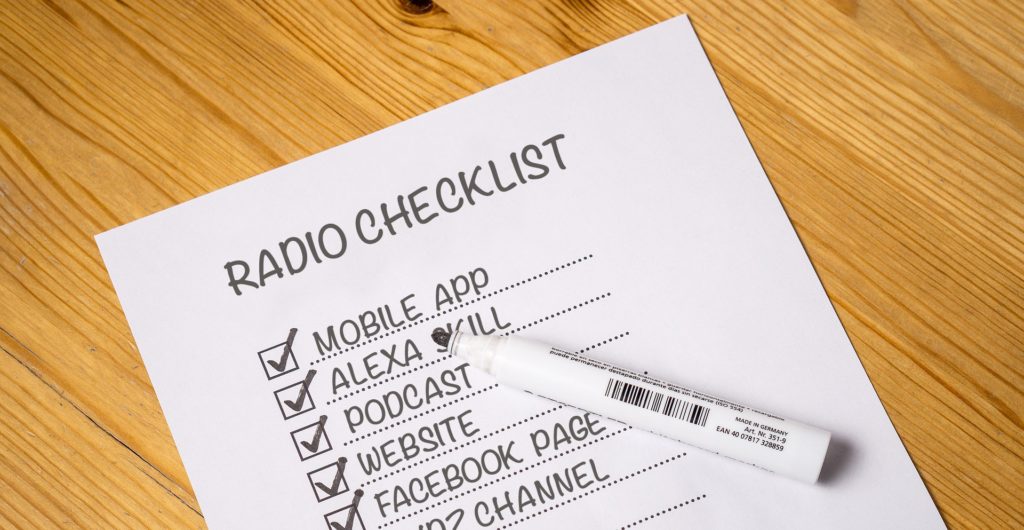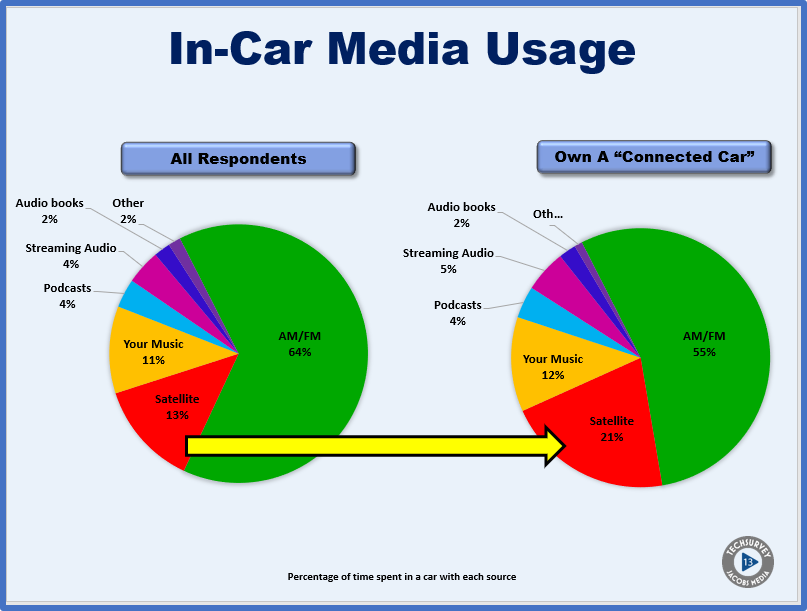 As broadcast radio companies battle new media competitors – as well as fight each other for ratings, shares, and revenue – a sense of who the industry is competing against becomes more elusive and even debatable.
As broadcast radio companies battle new media competitors – as well as fight each other for ratings, shares, and revenue – a sense of who the industry is competing against becomes more elusive and even debatable.
Aside from the changing radio ownership landscape, competition has taken many forms – services like Pandora and Spotify, a growing number of podcasts, personal music collections, and other stations in the market. They’re all battling broadcasters for consumer attention and advertising dollars.
And then there’s satellite radio. As time goes by, it’s becoming more apparent the threat from SiriusXM is a clearer and more present danger to broadcast radio. Considering the #1 location for AM/FM radio consumption is the car, then satellite radio provides the greatest challenge.
And as we learned in this year’s Techsurvey, that’s especially the case for people who own a “connected car” – one equipped with a media platform like Ford SYNC, Chrysler UConnect, or Toyota’s Entune.
 Among all respondents, broadcast radio has a solid 64-share in the car. But among owners of “connected cars,” AM/FM’s piece of the pie drops to 55%, while satellite soars to 21%. Interestingly, other streaming alternatives along with podcasts barely budge.
Among all respondents, broadcast radio has a solid 64-share in the car. But among owners of “connected cars,” AM/FM’s piece of the pie drops to 55%, while satellite soars to 21%. Interestingly, other streaming alternatives along with podcasts barely budge.
So what gives? Our theory is that SiriusXM is the biggest beneficiary of dashboard connectivity because it’s the easiest and most familiar for drivers to use. It still requires some work to access Pandora, Spotify, or podcasts in most cars. But satellite radio is seamless. It’s as easy to preset “Classic Vinyl” or “Deep Cuts” as WMGK or KSLX.
And when you think about some of satellite radio’s recent activities, broadcasters should be paying attention. Here’s why:
1. Pandora investment
Last month, it became official: SiriusXM has sunk a massive $480 million in Pandora. For the satellite radio giant, it’s a bold move and adds another attacker to the assault on broadcast radio. As SiriusXM’s CEO Jim Meyer told investors this week, they’re still looking for synergies between the two entities. Each has a strong automotive presence, as well as large audiences.
And a newly released “Definite Guide To Audio” – a strangely under-publicized “analysis” by Pandora – is more than a shot across the radio bow. Explaining that radio, a “century old medium is far from dead, but any impartial observer can’t ignore the tell-tale trends of a medium in transition,” Pandora cites an aging audience, cratering TSL, heavy commercial loads, and eroding dominance in cars as the culprits.
2. The new 360L platform
Pandora is doubling down on its stronghold – the car. When it goes live next year, 360L will offer SiriusXM subscribers time-shifting, on-demand, personalization, and great ad targeting. This more robust feature set will more strongly connect subscribers, as well as providing much-needed data for strategy as well as revenue generation.
3. Alexa
SiriusXM announced in June it’s officially invading the home via the suite of Amazon smart speakers. Once enabled, their “skill” allows satellite subscribers to access all channels with a simple, “Alexa, play Bruce Springsteen Radio on SiriusXM” – in kitchens, bedrooms, garages, and wherever these devices are placed in people’s home and offices.
So, what are the implications for broadcast radio as SiriusXM expands its position into streaming, in-car enhancements, and smart speakers?
It’s a message to radio companies the stakes have been forever raised. And it’s critical radio keeps pace. These investments by Sirius and the growing number of players in the digital entertainment space ratchet up the demands on broadcasters to provide a quality digital experience.
And yet in many situations, broadcasters have simply checked off the boxes for streaming, apps, podcasts, and other digital platforms, often providing minimal funds, strategy, and focus. It’s been easy and cost-effective to take the easy and cheap way out – opting for poor quality streams, utilitarian paint-by-the-numbers mobile apps, and recycled podcasts.
We’re seeing this now with the Alexa phenomenon that’s sweeping the industry. As we discussed in yesterday’s post, it’s essential broadcast radio brands stake their claims on these devices by providing relevant, memorable skills desirable to the rapidly growing number of owners of smart speakers.
And now the lure of DIY Alexa skills – as easy to assemble as a nightstand from IKEA – gives stations permission to cheap out – rather than develop a meaningful, fun, and entertaining experience using voice commands. And the industry ends up being lulled into thinking it has checked off the “Alexa box.”
Too often, radio spends most of it time and energy staring at the mirror, rather than thoughtfully studying the changing environment around it. The industry trades and gossip sheets are often filled with “radio stories” – who’s in financial dire straits, who’s merging, who’s swapping, and who just started in morning drive in Tulsa. Research is devoted to the analysis of local radio markets and genre segments, rather than on the bigger picture. And sales staff continue to chase “radio dollars.”
And yet, the game is now being played on a more complicated three-dimensional, multi-platform field. Digital can’t be thought of as a second house or a second car, and yet, that’s the way it often ends up in the grand scheme of things. When radio invests the bare minimum and exerts a minimal amount of strategic effort on its digital initiatives, it relegates these important outlets and initiatives to second-class status.
Yet, consumers don’t view streaming, podcasts, apps, and Alexa skills as rudimentary entertainment and information outlets. In fact, their standards rise every year as their patience for mediocrity and malfunctioning technology erodes.
When radio sees a formidable and direct competitor like SiriusXM, not to mention the bevy of streaming music services, brilliant podcasts, and compelling mobile apps, the need for digital strategy, commitment, and investment has never been greater.
No one knows exactly who first said it, but many attribute this quote to Kurt Vonnegut in “Cat’s Cradle.”
“In this world, you get what you pay for.”
One line that clearly was authored by Vonnegut applies to radio’s ongoing commitment to digital:
“And so it goes.”
It’s time for broadcasters to stop checking off the digital boxes, and get serious about SiriusXM – and the cornucopia of other digital attackers.
- What To Do If Your Radio Station Goes Through A Midlife Crisis - April 25, 2025
- A 2020 Lesson?It Could All Be Gone In A Flash - April 24, 2025
- How AI Can Give Radio Personalities More…PERSONALITY - April 23, 2025




I have (more than once in this blog) suggested that radio’s lack of commitment to digital starts at the top. I don’t want to perpetuate age discrimination, but it may be that a lot of the decision makers are just flat out of touch with many of the options that are appearing on the dashboard of connected cars. Yes, they know what a podcast is and have a basic understanding of Pandora and Spotify. But unless they’re part of your life (Alexa too) you probably don’t understand their importance and how to compete/access them.
I would maintain that using digital – all of it – is a big part of any radio honcho’s job. Pandora stations, Podcast subscriptions, Spotify playlists, Snap stories, ect. If you’re a radio bigwig and you don’t consider all of this a big part of your job, you’re missing an important part of it.
IMO, when they get it, they’ll do it.
I think you make some good points, Bob. It’s one thing to read about podcasts, study research, and even data reports. It’s another to discover and listen to them. It’s one of the reasons why Seth Resler is producing his own podcasts – you learn by doing. I think the industry has a heightened awareness that it’s important to do all these things. But being familiar with a technology and being immersed in it are two different thanks. Thanks for taking the time.
I was a PD in a medium market when Sirius and XM launched as separate entities, I took note and have been a subscriber of Sirius since day one. I, occasionally, would mention something from the satellite platforms to consultants, VPs and GMs, as something I heard or took and interest in came up for discussion that were may want to consider talking about for the future.
These discussions, many times got shut down, as I was told satellite radio 1.) Wasn’t radio, 2.) Will die off eventually, or I was told that I was a turncoat to radio by subscribing.
I had thought about how satellite radio had a lot more freedom than terrestrial radio, like FM radio in it’s early days. I pondered applying for jobs at Sirius and XM, one consultant told me that it would be a lonely job as no one had satellite radio, no one will pay for it, thus, the phones would never ring. (Interesting how they no longer ring for us any more…hello Facebook)
Funny how we are now in a place where the (now merged) satcaster continues to lead the way by innovating and forcing traditional radio’s hand, but still being ignored and poopooed as a Johnny-Come-Lately that isn’t legitimate.
The audience doesn’t care if it is legitimate or not. They like it and don’t know (or care) what the difference is.
We, in terrestrial radio, need to be careful or we will be that advertiser always tell everyone that “we have been in business since 1950” and goes out of business 6 months later because someone new came in as more efficient and less expensive.
Steve, good points all. More and more are paying for satellite radio – and enjoying it. Between their in-car invasion and the Alexa piece on the home front and workplace, SiriusXM is a force to reckon with.
It doesn’t seem all that long ago people started getting cable tv and my stance was “why in the world would people pay for TV when they could get it for free with an antenna on their roof? that’s just stupid” I thought the same thing about bottled water, I now believe as Siruisxm grows they will eventually spread to other parts of the world. Holding for the long term.
You may be right, Paul. Many people don’t mind forking over a few bucks a month if the content and experience delivers. Thanks.